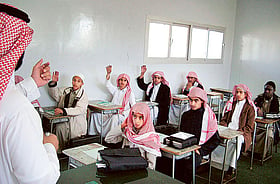Saudi Arabia Launches AI Curriculum Across Public Education System
Saudi Arabia is making significant strides in integrating artificial intelligence (AI) into its education system. Starting from the 2025–2026 academic year, a comprehensive AI curriculum will be introduced across all levels of public education. This initiative marks a pivotal moment in the country’s efforts to build a technologically proficient and innovative workforce.
The program is being spearheaded by the National Curriculum Center in collaboration with key government bodies, including the Ministry of Education, the Ministry of Communications and Information Technology, and the Saudi Data and Artificial Intelligence Authority (SDAIA). Together, these organizations are working to embed AI literacy into the educational framework of the Kingdom, aligning with broader national goals such as the Human Capability Development Program under Vision 2030.
A Curriculum for All Levels of Learning
The new AI curriculum is designed to provide students with essential digital competencies and AI fluency from an early age. It aims to ensure that learners at every stage of their education—from primary school through to higher learning—develop a strong foundation in AI concepts. The curriculum includes interactive and practical learning modules tailored to different age groups, ensuring a smooth progression of knowledge and skills throughout their educational journey.
This approach not only supports formal education but also extends into vocational training and university programs. Moreover, it emphasizes lifelong learning, recognizing the importance of continuous development in a rapidly evolving technological landscape.
Measuring AI Learning Outcomes
To reinforce the importance of AI education, the new curriculum will incorporate AI learning outcomes into the national student performance assessment system. This integration ensures that students’ progress in AI-related skills is formally recognized and evaluated, providing a clear benchmark for achievement.
In addition to technical skills, the curriculum places a strong emphasis on critical thinking and ethical understanding of AI. Students will be encouraged to explore the implications of AI technologies, fostering a generation that is not only skilled in using AI but also mindful of its impact on society.
Building on Previous Success
The rollout of the AI curriculum follows the successful pilot of an “Introduction to Artificial Intelligence” course for third-year secondary students in the general track. This pilot program was unveiled earlier this year at the Human Capability Initiative conference and was developed collaboratively by SDAIA, the National Curriculum Centre, and the Ministry of Education.
The pilot served as a crucial step in testing the feasibility and effectiveness of AI education in schools. It provided valuable insights into how AI concepts can be effectively taught and integrated into existing educational structures. These lessons will now inform the nationwide implementation of the curriculum.
Preparing for the Future
By introducing AI education at all levels, Saudi Arabia is positioning itself as a leader in emerging technologies. The initiative is expected to nurture a generation of innovators who are equipped to contribute to the country’s economic and technological growth.
With the launch of 166 ‘schools without walls,’ the push for community-based education further reinforces the idea of accessible and inclusive learning environments. These schools will play a vital role in supporting the AI curriculum and ensuring that students from diverse backgrounds have equal opportunities to engage with AI technologies.
As the 2025–2026 academic year approaches, the focus remains on building a robust and sustainable AI education system that prepares students for the challenges and opportunities of the future.






